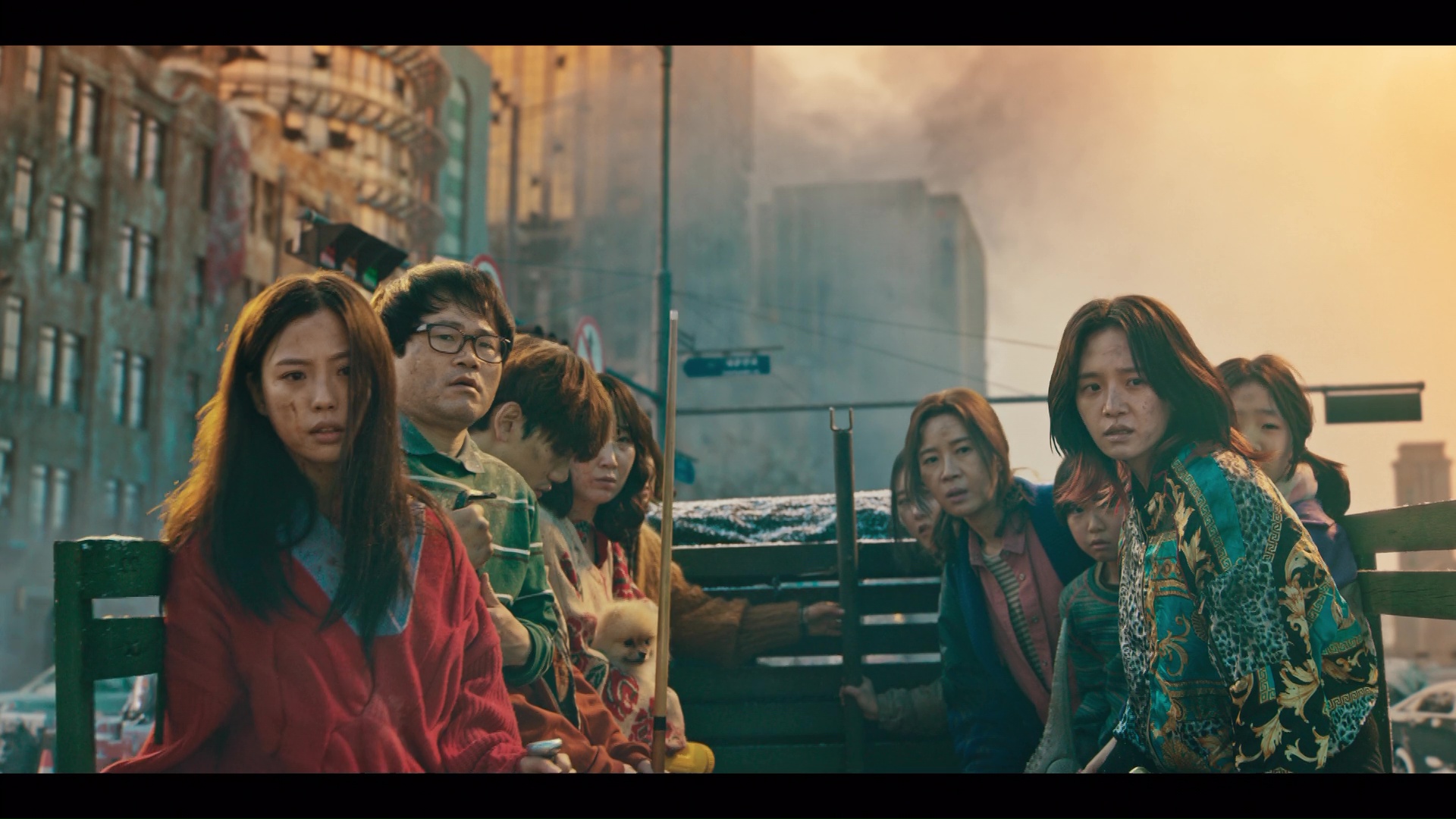Just in time for the holidays, we’ve been gifted with a new Netflix original series that is bold and apocalyptic, true to our times. Based on a popular webtoon, Sweet Home follows a motley group of apartment residents fighting inner demons and literal monsters in their midst. Although the gory visuals may be an initial appeal (or repellent), the true draw of the show comes from the individual stories of our residents, who have complex stories of loss, grief, and redemption. The monsters may have been the most expensive part of the production, but the humans and the struggle to be human are at the center of this series.
Like Kingdom and Extracurricular, this series maximizes the liberties offered on the Netflix platform, including graphic visuals, explicit violence, and lots (and LOTS) of money. With PD Lee Eung-bok (Mr. Sunshine, The Lonely Shining Goblin) at the helm, expectations were high for a production value that would match the budget. I think the series almost met those expectations, and we’ll see if this perspective is shared by Netflix and the viewers as we await news about a second season. Considering the webtoon’s content, Netflix seemed like the only platform to do this visual storytelling justice, but full disclosure: I didn’t finish the webtoon. As someone who didn’t read the full webtoon, I’m approaching this series with less expectations and am curious about the webtoon fans’ thoughts on the show.
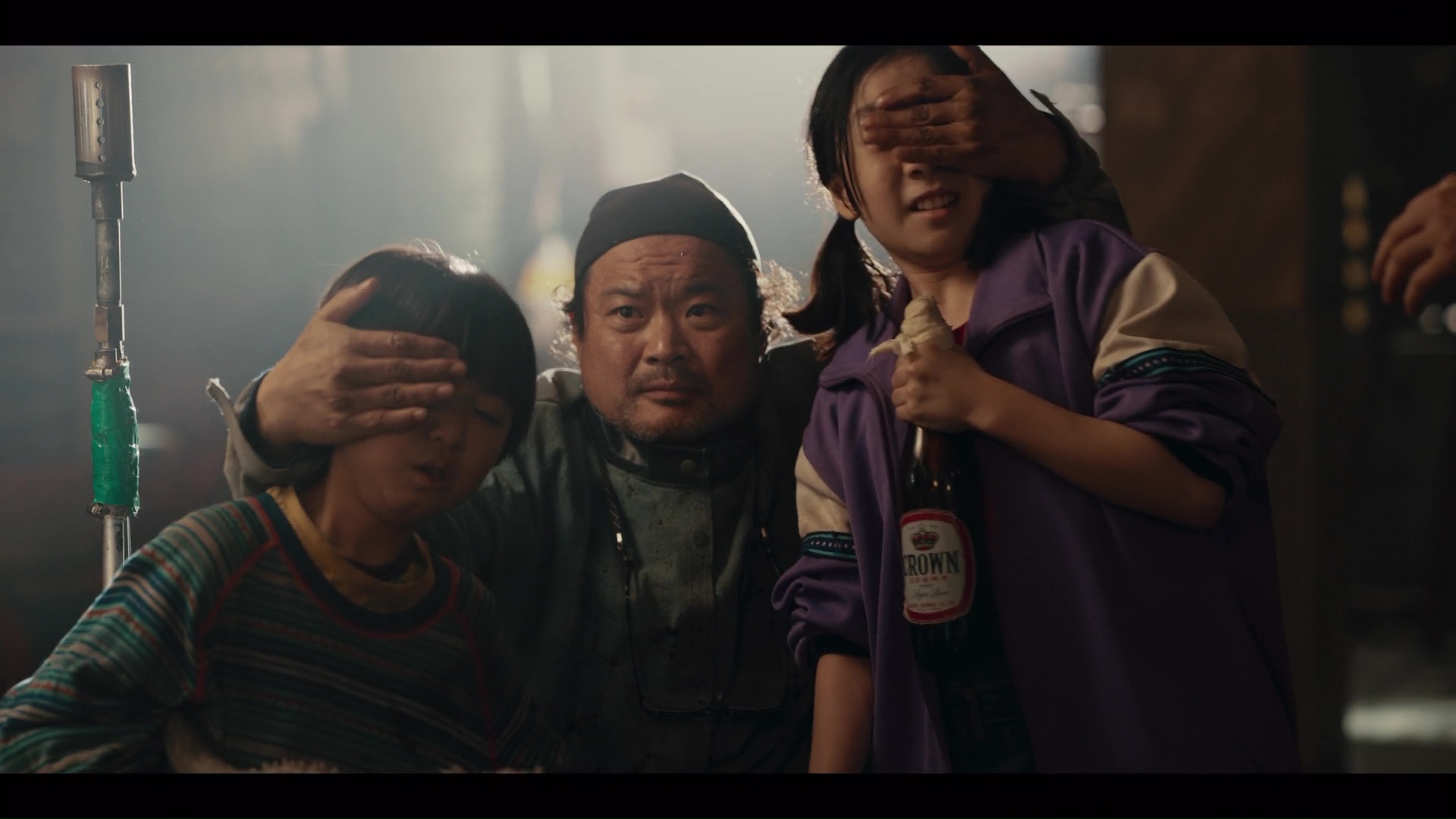
This review summarizes main plot points and covers my thoughts on elements of the show, but details are missing. While the details are not necessary to understand the show, the onscreen details in the interactions are a charm of the show, often portrayed in unspoken interactions. I cover the main themes and examples of these moments, but watching the show can fill in those valuable pieces that I’m missing. For those who plan on watching the show, beware of spoilers! Again, the details are not all there, but if you want the full experience of watching the show, you should stop here. For those who’ve seen the show, for those who cannot bear the gore, and for those who need the spoilers, let’s get started.
THE PREMISE
Welcome to Green Home, a rundown apartment building that houses residents with complex and often mysterious backstories of loss and resilience. A new resident joins Green Home after tragically losing his family to a car accident, and he plans to commit suicide to end his suffering and pain from relentless hardships. But the world beats him to it. The world as we know it collapses into chaos after a novel disease spreads and transforms humans into monsters. The disease painfully manipulates humans’ deepest desires with an irresistible lure, and once infected, humans quickly fall victim to their inner demons. Rarely can humans resist their demons, but one unlikely human/monster exists in Green Home: the new resident, a suicidal high schooler, Cha Hyun-soo.
THE SURVIVORS
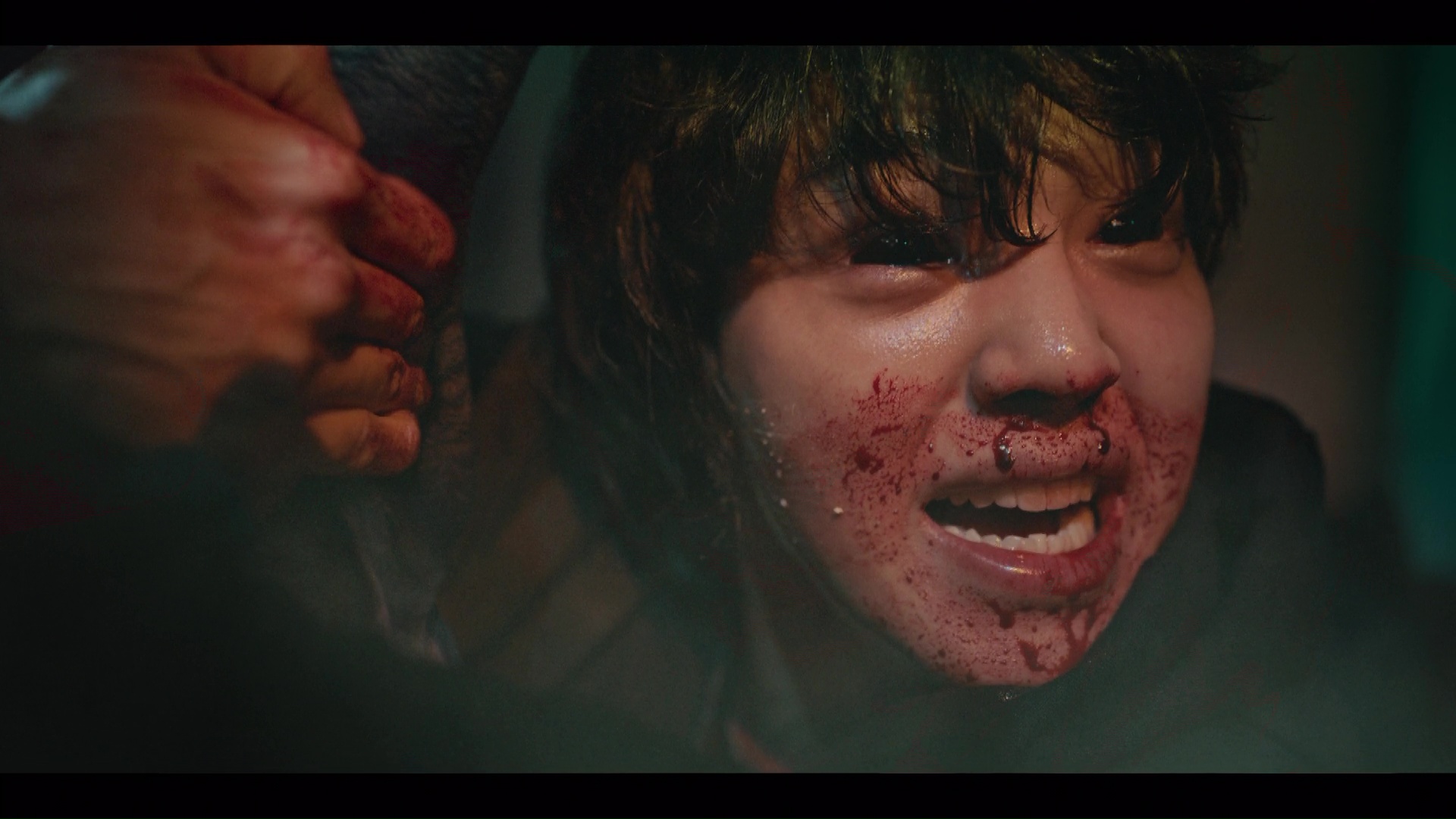
The main character, 19-year-old CHA HYUN-SOO (Song Kang), is the newest resident of Green Home and the human/monster who carries the show through its exploration of humanity and cruelty. Prior to losing his family in a car accident, Hyun-soo was a victim of extreme bullying from a classmate, who manipulated his father’s power to justify his violence. Disillusioned by the betrayal of his friends and negligence of his family, Hyun-soo became severely depressed. His deepest desires for death manifested in his alter ego monster that prodded him to quench his thirst, but he countered those dark desires with his will to survive. Existing alongside human survivors, Hyun-soo faces rejection, acceptance, temptation, and comfort as he learns to navigate the apocalypse with his dual identity.
Living above Hyun-soo is YOON JI-SOO (Lee Kyu-young), a bass player who moved into the apartment after her partner committed suicide. She moved in a week before Hyun-soo and had just met a few neighbors, including JUNG JAE-HEON (Kim Nam-hee), before the world spiraled into destruction. Jae-heon is a Korean language teacher and a devout Christian who finds reason in God’s will. Trained in fencing, Jae-heon is an expert swordsman and fights off monsters with his sword while Ji-soo’s weapon of choice is a baseball bat.
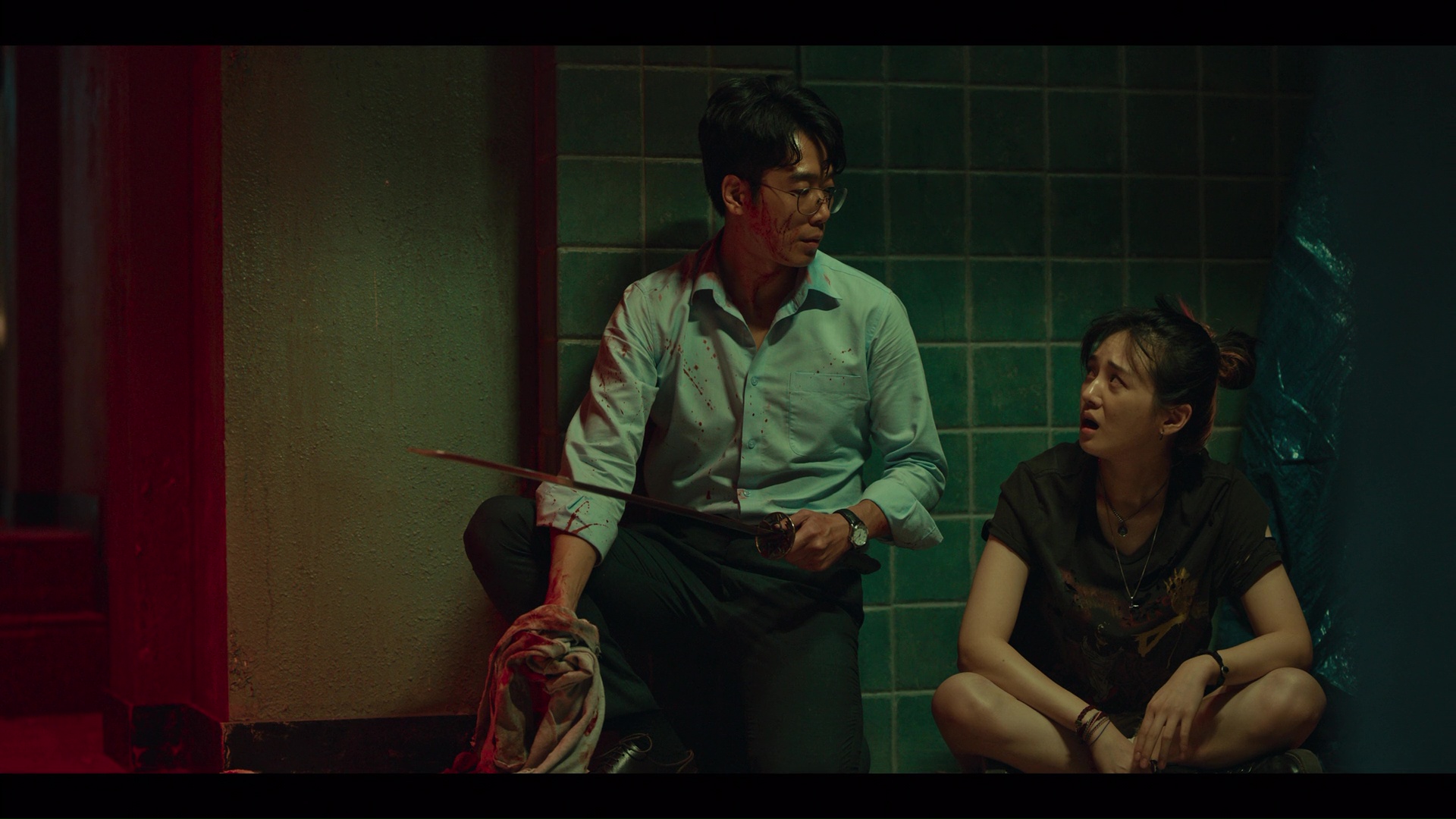
A few doors down from Hyun-soo lives HAN DOO-SHIK (Kim Sang-ho), an army veteran who uses a wheelchair. Doo-shik is a skilled technician and becomes the survivors’ builder and engineer. He first meets Hyun-soo in their mission to save two children, Kim Young-soo and Kim Soo-young, who lost their father to a monster. Doo-shik becomes the guardian for the two children and joins the survivors as the vital technician who upgrades the weapons to monster-fighting grade.
Also vital to the survivors, LEE EUN-HYUK (Lee Do-hyun) plays the role of the survivors’ strategist and de facto leader. Cold and logical, Eun-hyuk is often the “bad guy” and makes the tough survival decisions, including some morally questionable ones. His cold demeanor melts only slightly when interacting with his younger stepsister, LEE EUN-YOO (Go Min-shi), an aspiring ballet dancer who gives up on her dream because of her injured ankle. To support Eun-yoo’s dream, Eun-hyuk took a leave from medical school to work, but rebellious Eun-yoo dismisses him. She’s full of attitude, but her eye for people’s weaknesses becomes an asset in the right moments.
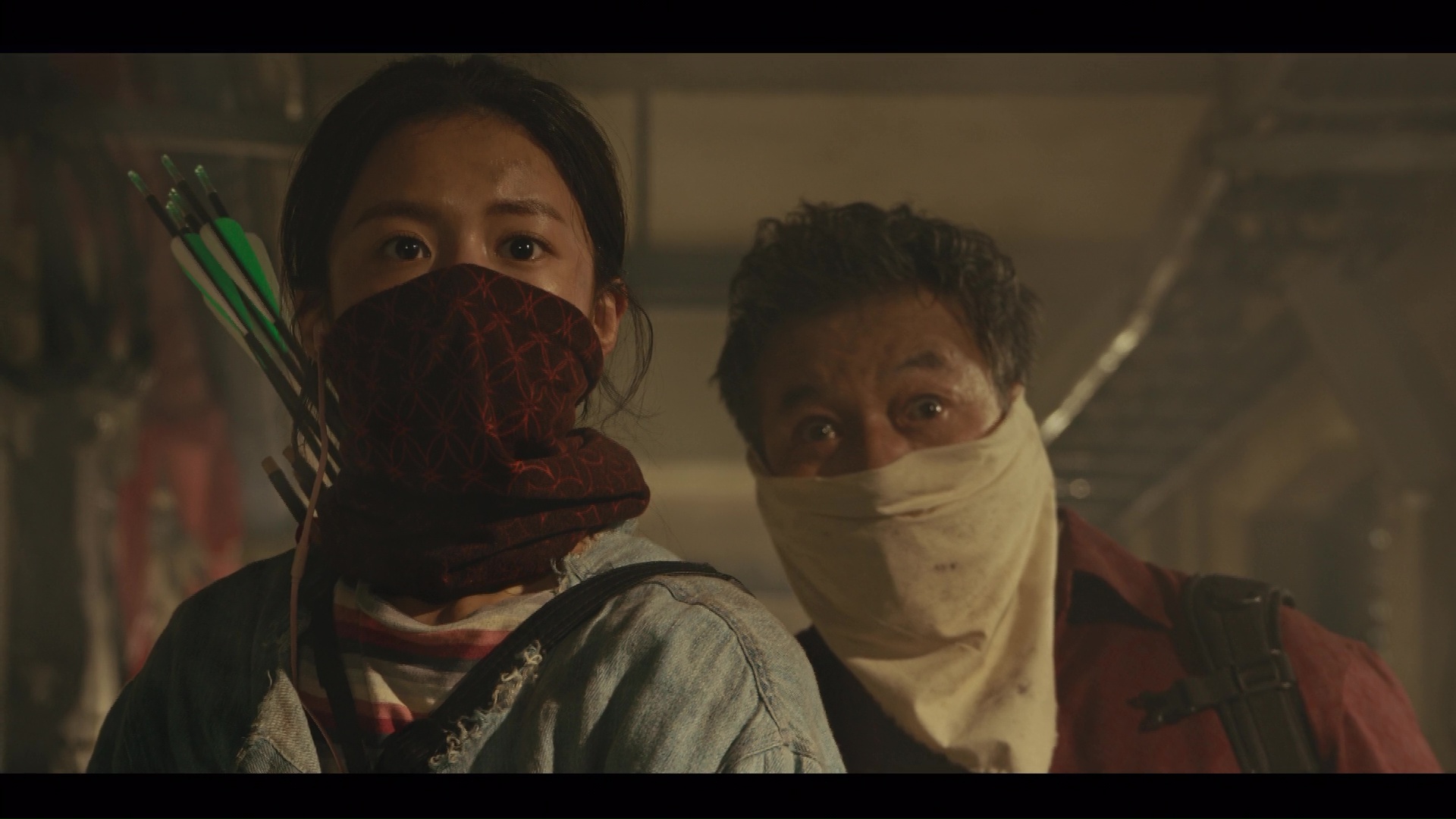
Serving as the group’s sage, AHN GIL-SEOB (Kim Gab-soo) fights the zombies with his flamethrower and is accompanied by his caretaker, PARK YOO-RI (Go Yoon-jung). Gil-seob is terminally ill and approaches the fight fearlessly because of his proximity to death. Though he receives care from Yoo-ri, he also takes care of Yoo-ri, who has asthma, and others with his grounded wisdom.
A key character in the drama series but not in the original webtoon, SEO YI-KYUNG (Lee Shi-young) is a firefighter who formerly served in the special forces. She lost her scientist fiancé just before their marriage, and she discovers that his death is connected to the monster plague. Her strong intellectual and physical skills save the survivors from crisis, but her determination to uncover the truth about her fiancé leaves the survivors, especially Hyun-soo, in a precarious position.
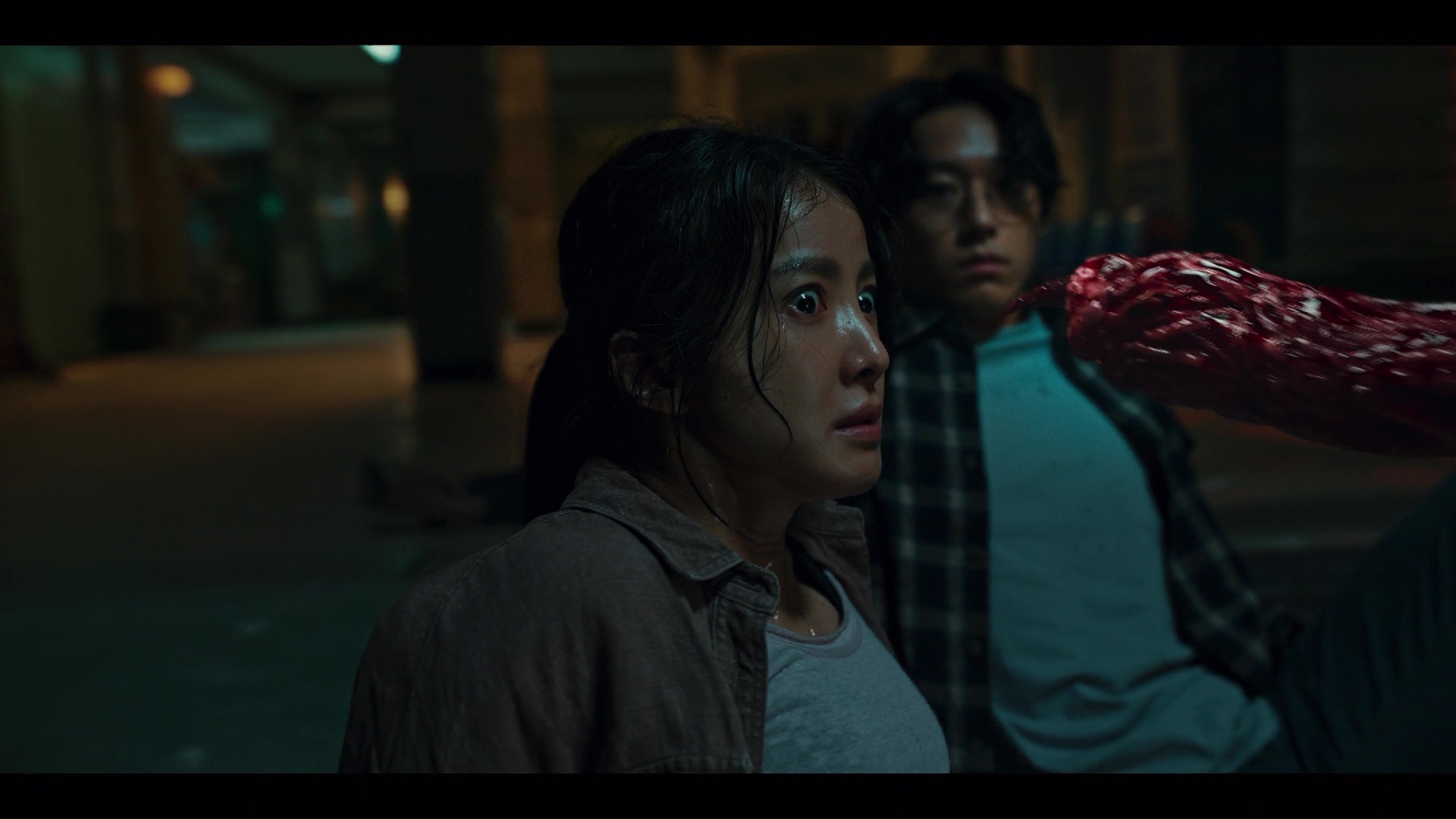
The only character who isn’t a Green Home resident, PYUN SANG-WOOK (Lee Jin-wook), visits the apartment on a mission to kill one of the residents. Sang-wook a skilled hired killer with scars all over his body, but the burn on his face is particularly important to his backstory. Sang-wook was the only one to survive the fire that killed his family, and he killed the arsonist, who showed no remorse for his crime and received no punishment by the justice system. He’s calloused about death and pain, but he slowly regains his humanity through his interactions with the survivors.
A handful of other characters round out the Green House survivor bunch: apartment convenience store owner and wife, mourning mothers, the Pomeranian owner, the solider, and the guard, to name a few. Each character — alive, dead, or monster — offers key contributions in the exploration of humanity, cruelty, and sacrifice.
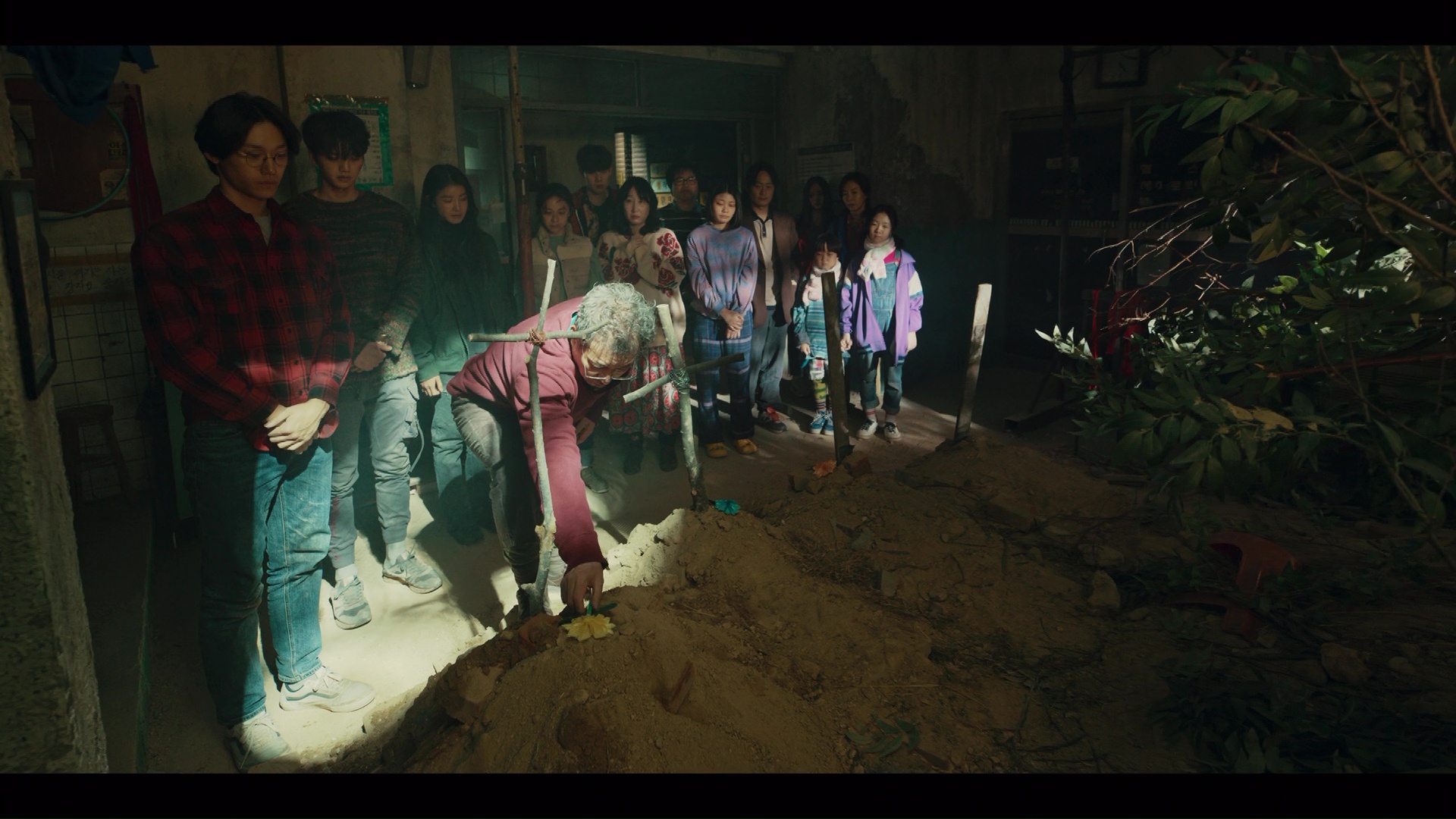
SERIES REVIEW
It’s a snowy night in September 2020 — one month after the inception of the monster plague — and armed forces surround a young bloodied man, Hyun-soo, who walks out of ruins and toward the soldiers. The snipers shoot at barefoot Hyun-soo, but the bullets don’t seem to hurt him. In the debris around the Hyun-soo, creatures contort and flinch as he walks into the search light.
A voice narrates: “Someone once said that even the deepest darkness disappears in the dimmest light. This a story about us finding a reason to live in a world where finding this reason is harder than merely surviving.” This introductory narration rings truer the longer the survivors stay alive, when survival — not death — seems to be the punishment.
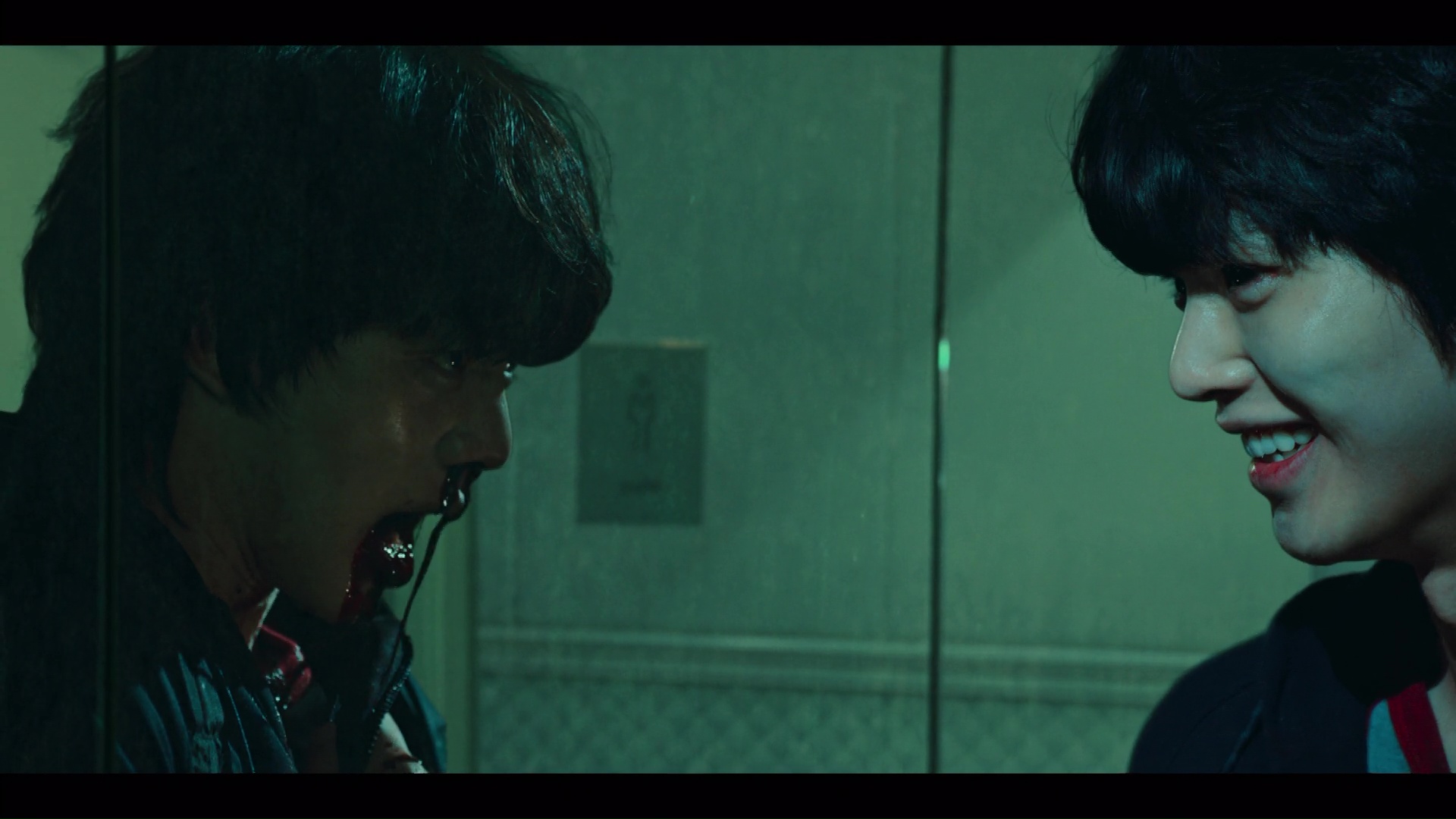
Jumping back one month, the first episode briefly introduces our characters and immediately presents the monster catastrophe. With little warning and no explanation of the cause, the abrupt appearance of first monster, Hyun-soo’s next door neighbor, has a shock factor, both visually and narratively. From the few context clues, it seems that the woman’s efforts to lose weight for auditions resulted in her overwhelming hunger, the desire that overtook her human self.
While Hyun-soo, Sang-wook, and Ji-soo encounter this hungry monster, the Green Home residents in the lobby meet the bloodsucking monster that uses its long extending tentacle to suck the blood from its victims. The Green Home residents find themselves locked in the building, and it’s unclear who locked them in and why. Were the residents locked in to save them from the monsters outside, or were they locked in to save the outside world from the monsters enclosed in the building? No clear answers are provided, but it’s an interesting question to revisit throughout the series.
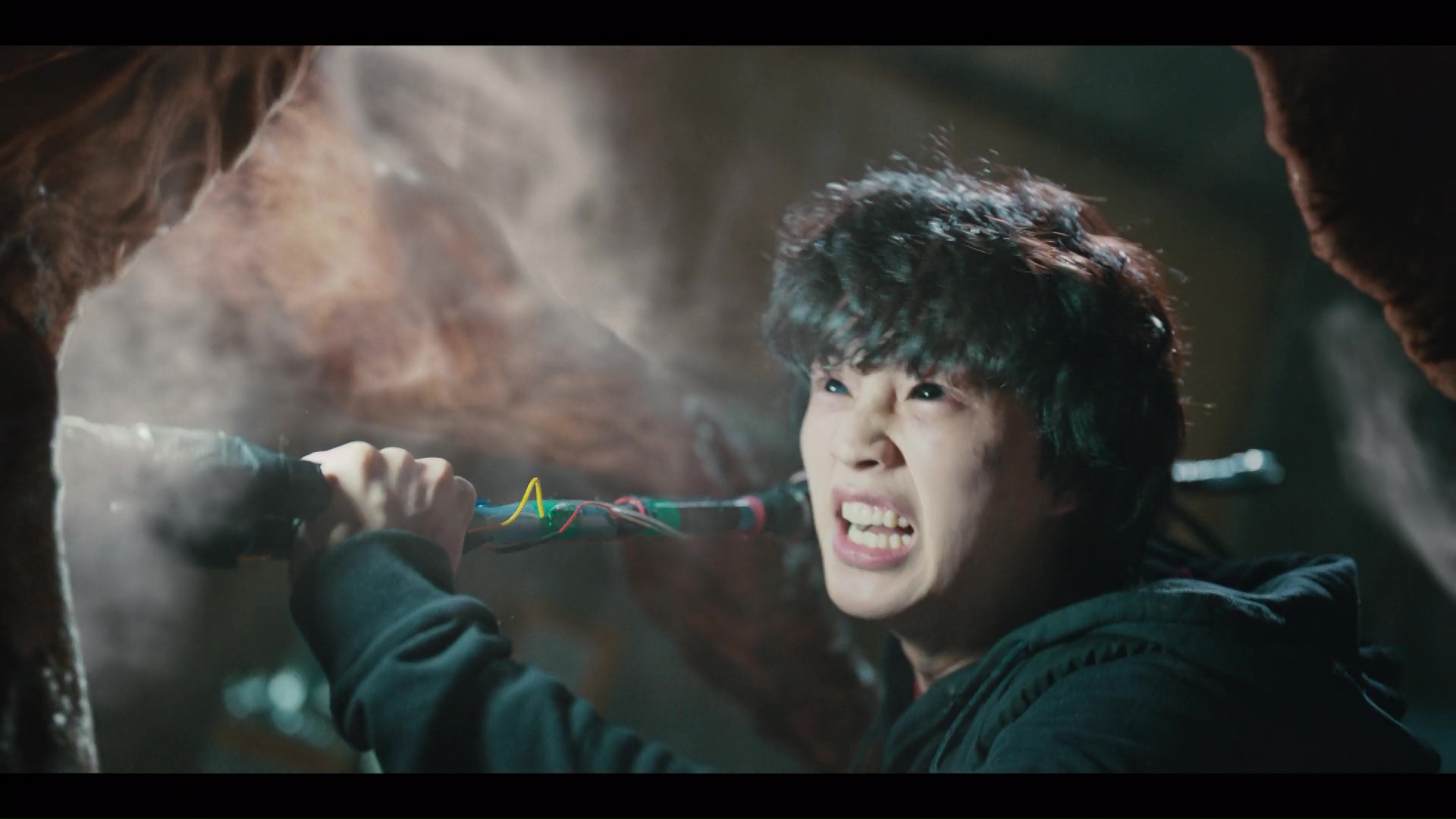
In the following episodes, the mystery around the disease unfolds. The disease originates from inherent human desires, and those infected experience symptoms of hallucination, aggressive behavior, and the iconic nosebleed. With no contagion to blame for the disease, the survivors’ fear of each other is heightened, resulting in harmful acts of self-preservation and negotiation. The convenience store owner is the prime example of human fear and greed causing harm, and he is the main human antagonist among the survivors. His greed and mistreatment of his wife seems to challenge the dichotomy of human and monsters, which becomes further blurred when the survivors realize that they could become monsters at any time.
The initial monsters we meet, including the lotus root monster (aka the blind monster) and the protein monster, are undeniably unhuman and blinded by their desires, and they seem to exist more for entertainment value. We never meet them as humans, so it’s easy to root for the humans to kill the monsters. By only meeting these humans as their monster counterparts, we forget that the monsters getting killed were humans at one point. As viewers and for the survivors, this perspective on monsters gradually changes as we meet the humans before their transformation into their monster alter ego.
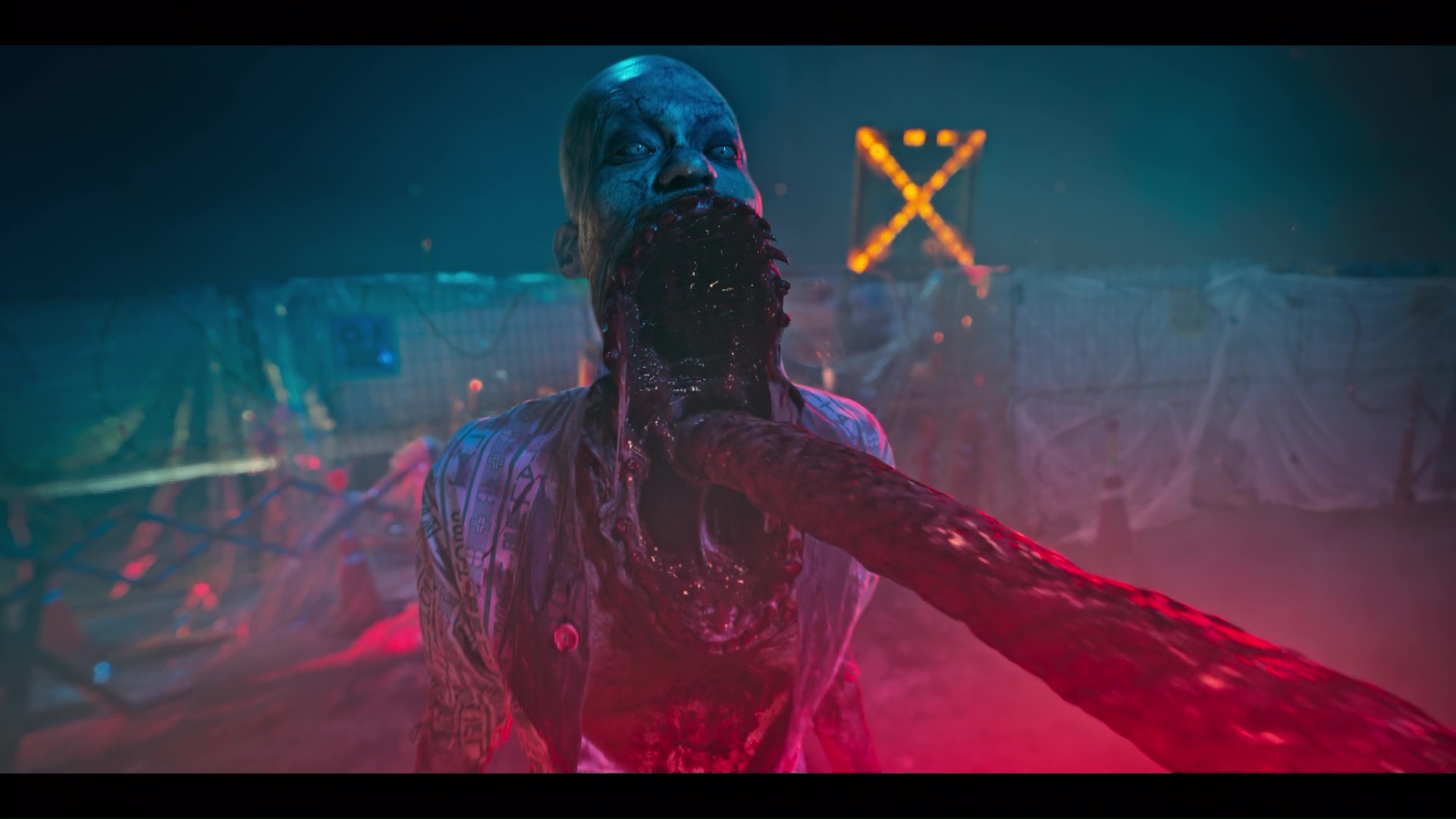
A quite note on the monsters: visually, the monsters are really hit or miss. Some of the monsters, like the bloodsucking monster and the running monster, were well done, but others were disappointing. The lotus root monster looked a bit like claymation and the protein monster was just okay. The lower quality monsters did not distract me from the story, but I did need to suspend my belief a little extra when watching the action scenes. Given the budget for this series, I was expecting the CGI to be better, but maybe they had more important things to cover with the money. I digress.
Back to the better parts of the show, the monster fighters pair up to save each other and begin to find purpose in their fight for survival. Ji-soo and Jae-heon save any stragglers from monsters on their way downstairs; Eun-hyuk and Yi-kyung maintain the safety of the lobby survivors; and Hyun-soo and Doo-shik embark on a mission to save the downstairs children who heard their father fall to his death from a monster attack. The calling from the children saves Hyun-soo from killing himself and gives him new purpose, but his savior instinct also awakens his inner monster, an ego driven by indignation. Hyun-soo’s desire to save the children defeats the overwhelming indignation, and the children become his initial reason to live and fight. The cursory explanation for the abrupt shift in Hyun-soo’s attitude could use more substance, and I can only assume that the children were the compelling purpose he desperately latched onto to escape his desolate reality.
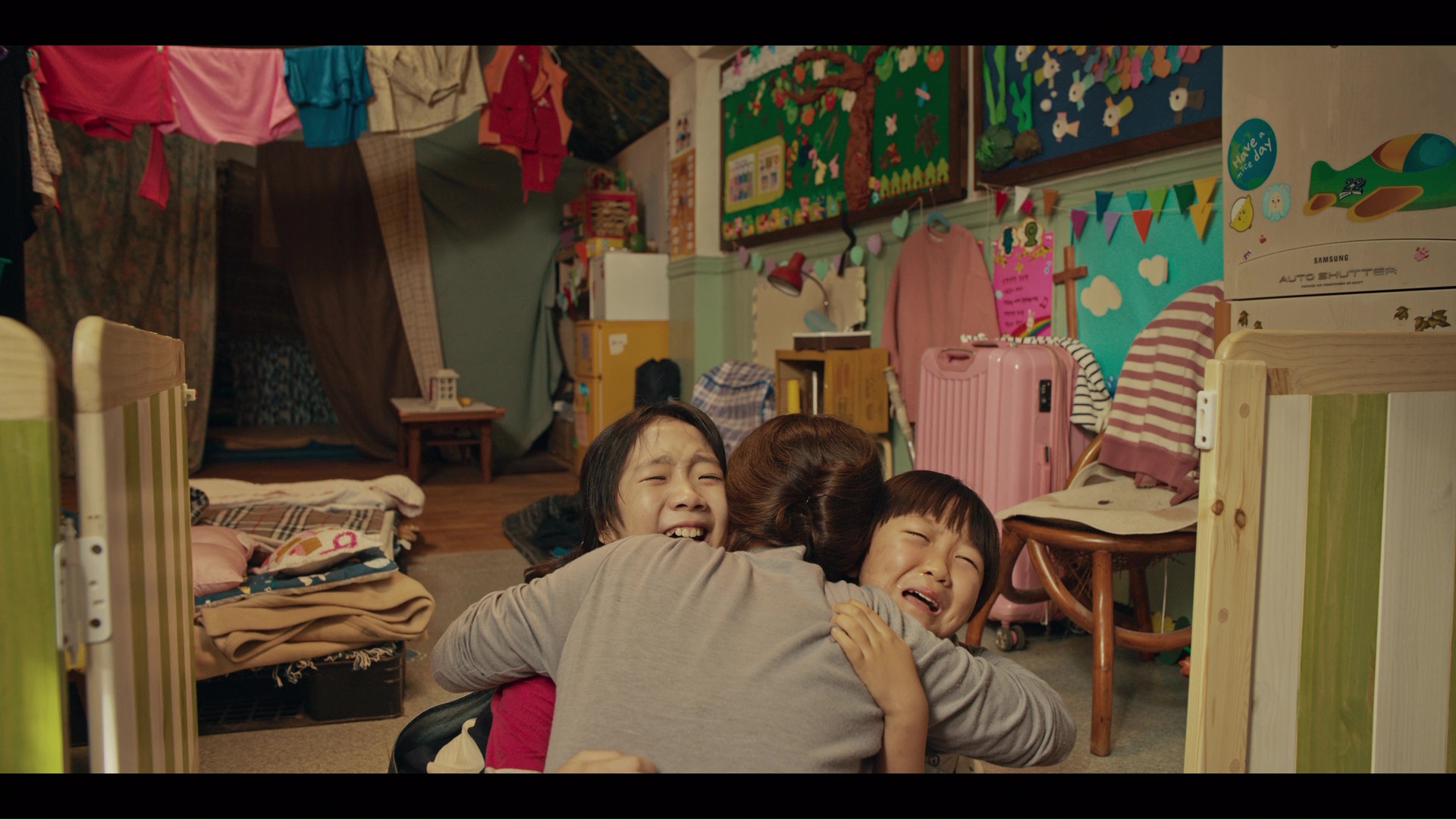
Just as Hyun-soo comes to rely on the children, Soo-young and Young-soo, as his initial reason to live, other survivors, namely the mothers, find comfort and purpose in protecting the children. Resident Lim Myung-sook tragically lost her baby, and this loss is what transformed her into a rare harmless monster. Driven by her loss, Myung-sook’s actions as a monster and as a human are always protective of the children. Even when completely engulfed by her inner monster, Myung-sook manifests her loss and desire by becoming a completely harmless fetus monster in a womb. From the human side of motherhood, daycare center director Cha Jin-ok copes with her loss of her daughter to the bloodsucking monster by taking care of the children. The instinctual desire to protect the children is the obvious example of the survivors living for each other and is a nice prelude into how the survivors fight for and sacrifice themselves for the group.
The show becomes much more interesting once the survivors grapple with the ethical implications of the human versus monster dichotomy, starting with the vote on whether to keep Hyun-soo alive. Cleverly redefining “golden time” as the period in which one can kill a monster, the show asks what defines “human,” “monster,” and “murder.” The vote on whether to kill or save Hyun-soo ends in a tie, and the convenience store owner Kim Seok-hyun, the most vocal proponent of killing Hyun-soo, gets a nosebleed, a sure sign of infection. Desperate to survive, he asks Hyun-soo how to save himself, and there is some satisfaction in seeing a despicable man try to recover from shooting himself in the foot. Seok-hyun ultimately falls victim to the monster within and is killed within the golden time by his wife. His last words to her are an apology — the first time he’s ever apologized to her — and her painful regret captures the complexity of the relationship and her deed.
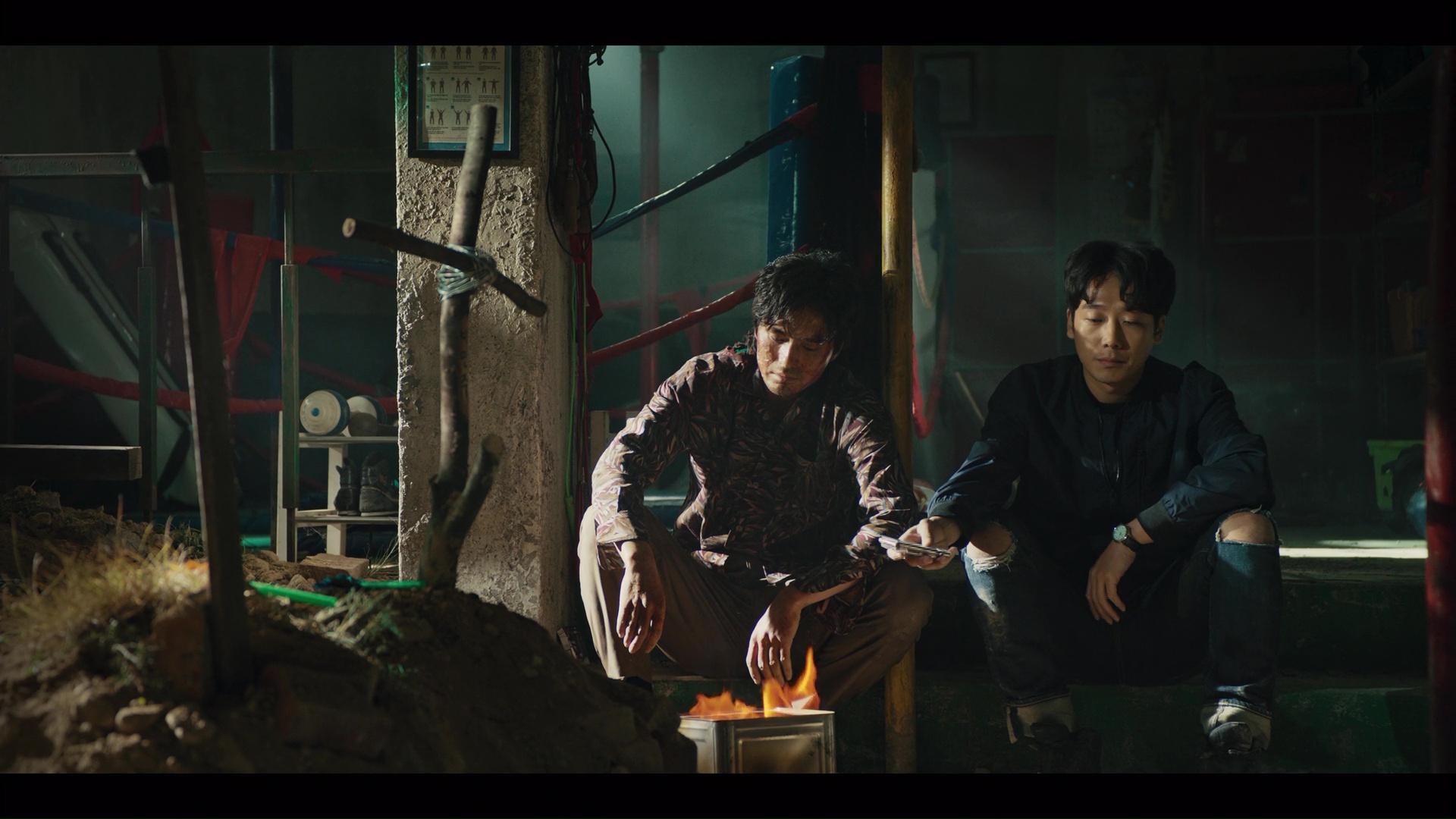
While Seok-hyun seeks survival advice from Hyun-soo, another resident comes to Hyun-soo with a twisted desire to degenerate into a murderous monster, once again questioning the distinction between human and monster. This twisted resident is murderer Choi Yoon-jae, the target of hired killer Pyun Sang-wook, and he suffers one of the most disturbing deaths of the series. We learn about Sang-wook’s mission, a plea from a desperate father searching for his daughter, and once Sang-wook discovers Yoon-jae’s secret darkroom with photos of his victims, the meaning of “human,” “monster,” and “murder” all become relative. The revenge in the form of a brutal death seems justified, and the residents agree with this punishment. Murder is accepted depending on the context, and guilt is subjective.
Calculating and aloof, Eun-hyuk’s humanity — or lack thereof — comes to question when considering the definitions of those three key words: human, monster, and murder. He’s a cold-blooded strategist and compels Hyun-soo to sacrifice himself for the dangerous tasks. Eun-hyuk considers Hyun-soo their strongest weapon and feels no remorse with using transforming humans, who will continue to grow in number. He interprets the tie vote to save Hyun-soo as a confirmation of everyone’s fear that they could suffer the same fate as a monster. His lucid perspective devoid of emotional distractions makes him seem dangerous, but his transforming humanity also gives him the most interesting arc in the series.
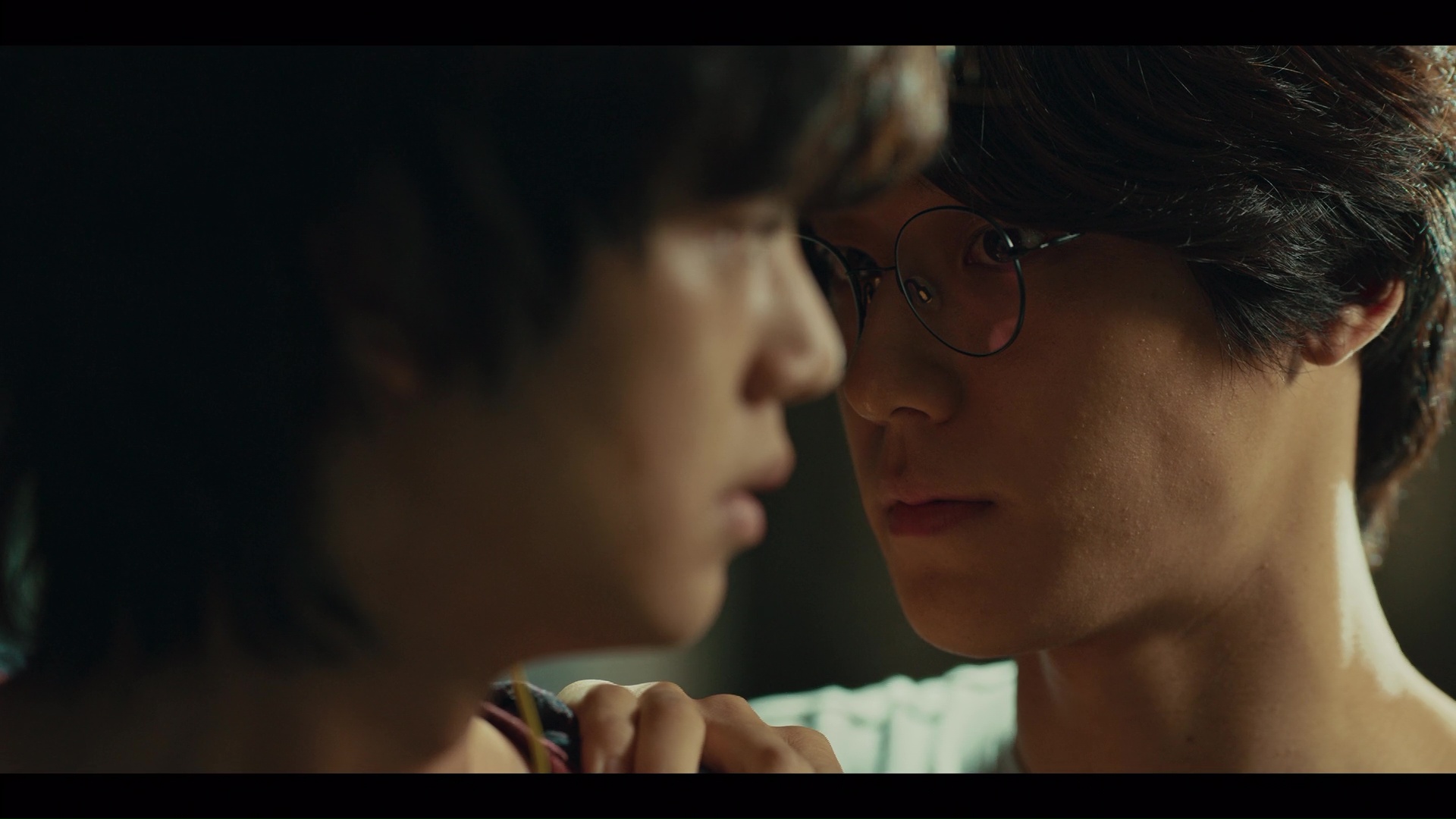
In his initial survival mode, Eun-hyuk finds more value in a person’s contributions and skills, but his requests to Hyun-soo change to value human life. For Hyun-soo’s first mission to fetch Doo-shik, Eun-hyuk makes it clear that the children should be abandoned if the situation turns for the worse. But when he needs to save Ji-soo with an emergency appendectomy, he tells Hyun-soo that his mission should prioritize hospital supplies to save Ji-soo, with food as the secondary goal. This shift in Eun-hyuk’s approach happens across multiple episodes, and his strict rules start to loosen as his priorities shift.
Sang-wook’s journey to redemption and his unlikely friendship with Jae-heon provides another example of humanization. After learning about Sang-wook’s mission to find a father’s young daughter, Jae-heon sympathizes with him. He likens his journey out of alcoholism through religion to Sang-wook’s own coping mechanism, and he encourages Sang-wook to find a new way to cope, starting with manning the convenience store as his contribution to the community of survivors. While he is a killer, Sang-wook still has a moral code, and his background adds more layers to his identity. Stoic Sang-wook is a man of few words, and his actions capture his gradual progression from killer to savior.
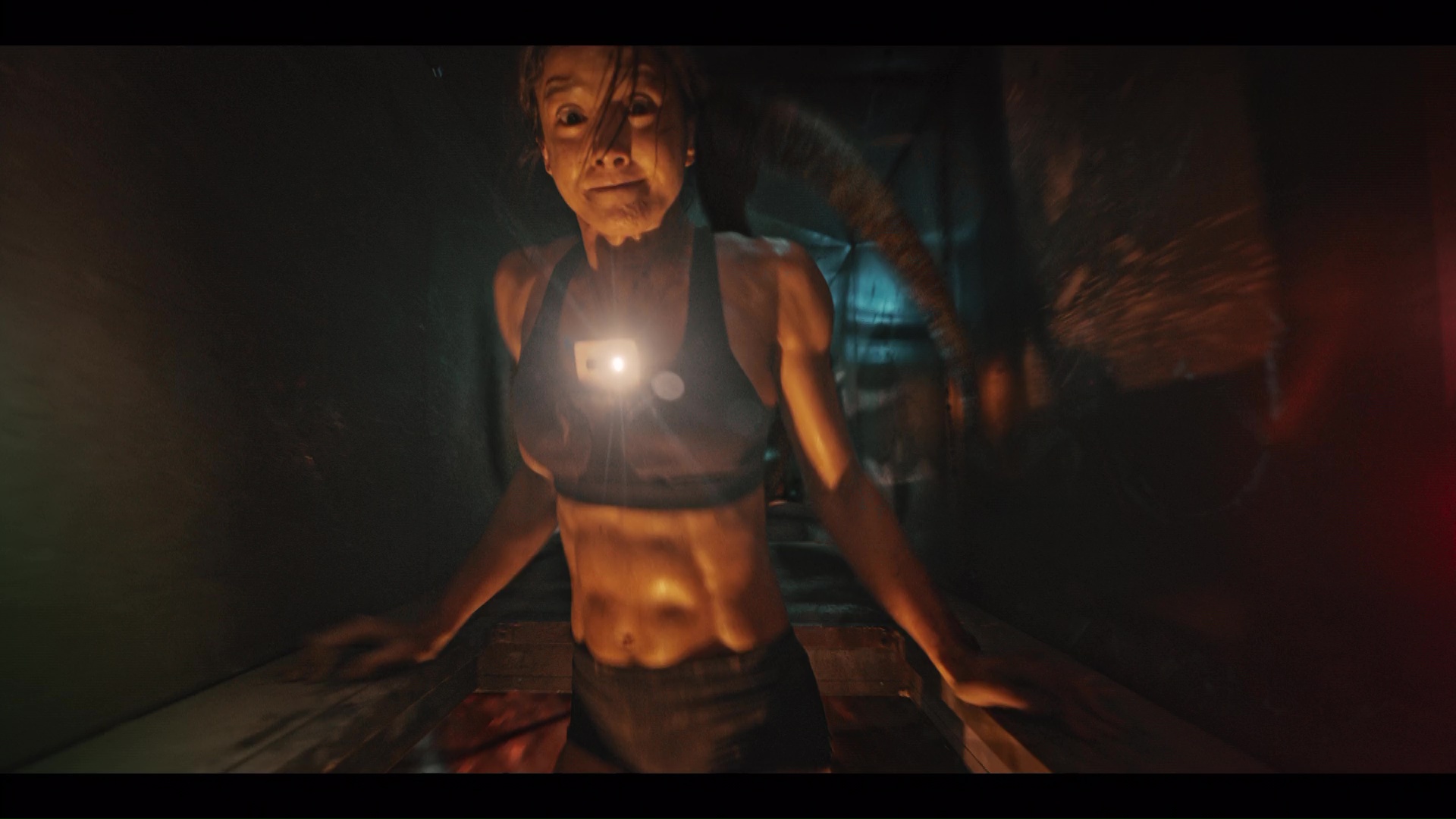
Despite being the main monster fighter, Hyun-soo’s action scenes are minimal, and the highlights of the action come from Yi-kyung. The escape scene through the vents was incredible and definitely the best action sequence of the series. Only Lee Shi-young could convince me that she’s a trained firefighter and ex-special forces. Apart from the action, Yi-kyung is a crucial character that drives the story forward, and as the only character who explores the apocalyptic world outside of Green Home apartments, she is the crucial link to survival and the answers about this infection. Without her character, I think the series would have lost momentum and felt a bit claustrophobic set exclusively inside Green Home.
Up to the halfway point, Eun-yoo seems uninvested as she mocks her fellow survivors’ diligence to prepare for the fight, but her sympathy for Hyun-soo’s hidden pain and unfair exploitation gives way to her joining the fight. She sees Hyun-soo’s scars from self-harm and knows that his scavenging trips, which also include the retrieval of survivors’ nonessential belongings like a diary or sunscreen, hurt him. Eun-yoo’s reminder to Hyun-soo to express his pain prompts her to drop her scorn and join the fight when it matters. When push comes to shove, Eun-yoo decides to contribute to their defenses, and it’s noticeably all the women who commit to the practiced defense plan. With a few exceptions, the men are cowards.
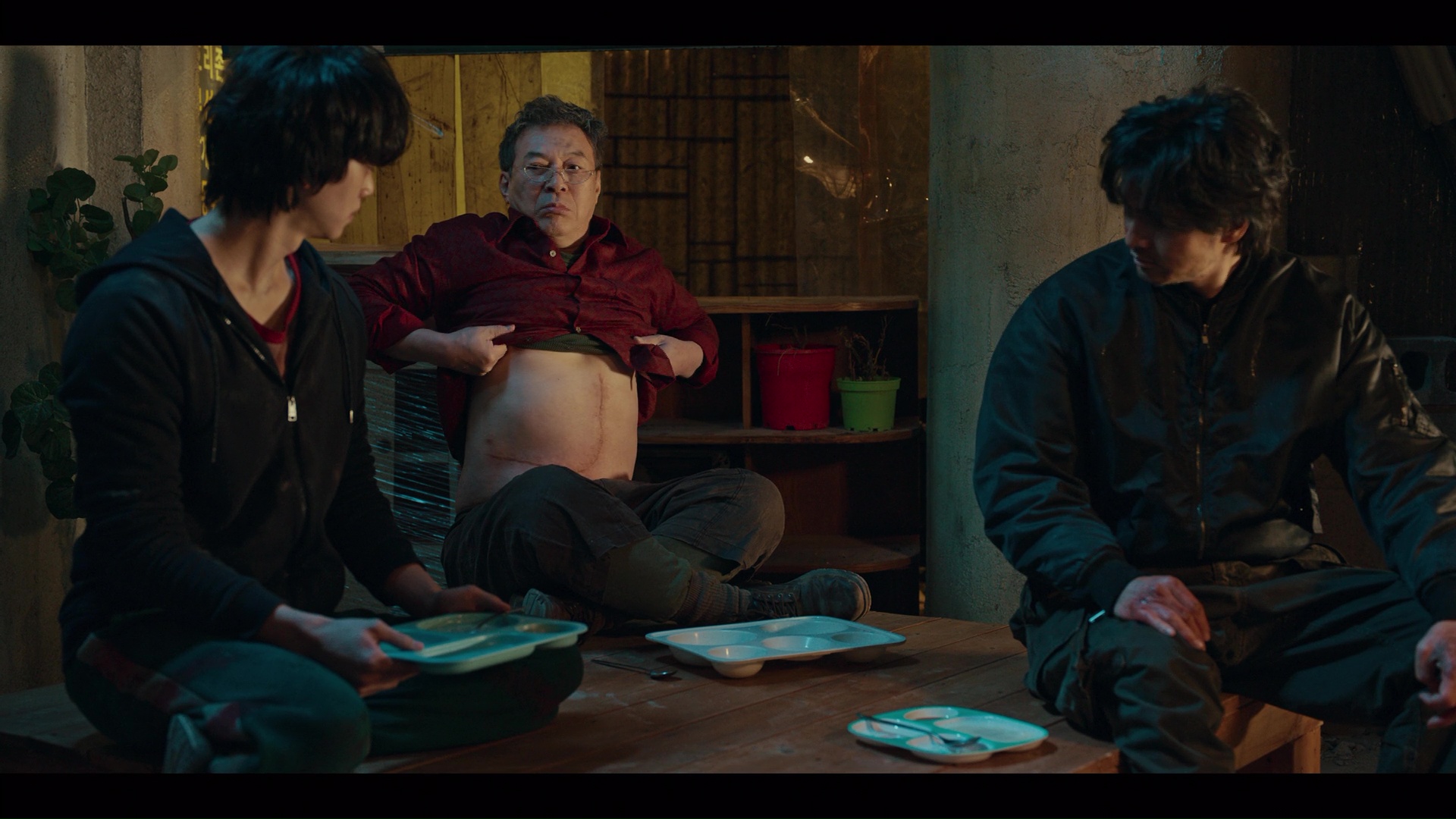
As noted throughout, the theme of humanity is the through line of the series and manifests in various ways. One character who consistently exemplifies humanity is Gil-seob. A notable exception to my claim about the cowardly men, Gil-seob offers his sound wisdom and welcome levity in the midst of the gloom. His indiscriminate compassion reaches the outsiders like Sang-wook and Hyun-soo, and he reminds everyone to behave like decent humans. His partnership with little Young-soo as “secret agents” is also the most endearing relationship of the series. If Eun-yoo’s sharp criticisms are like a slap in the face to shove people into action, Gil-seob’s stern reminders of humanity are like a tight hug to stir your heart into action. He is often the glimmer of light in the darkness, and another glimmer is offered in the form of music. Hyun-soo hears Ji-soo playing the guitar and notes that the song reminds him of coming home. She titles the song “Sweet Home,” the show’s namesake, and enjoys Ji-soo’s live performance in a moment of rest. Something as simple as enjoying music becomes an indication of humanity.
Humanity is also reflected in relationships, new and old. Eun-hyuk and Eun-yoo’s tense relationship starts to mend once Eun-yoo lets down her guard, and their brief moment of sibling intimacy — Eun-yoo fixing Eun-hyuk’s glasses — feels like sigh of relief. Eun-yoo’s sympathy for Hyun-soo turns out to be a little crush, and Eun-hyuk teases her by congratulating her on her first love. Ji-soo and Jae-heon share a mutual curiosity and admiration for each other beyond their monster-fighting partnership. There is something very human about seeking meaningful companionship, despite and especially in the apocalyptic world. The strive to be human and remain human hinges on human connection, and the show does a good job of not trivializing these relationships. With these relationship moments embedded in the storytelling, the show always stays grounded in the fundamental question of humanity.
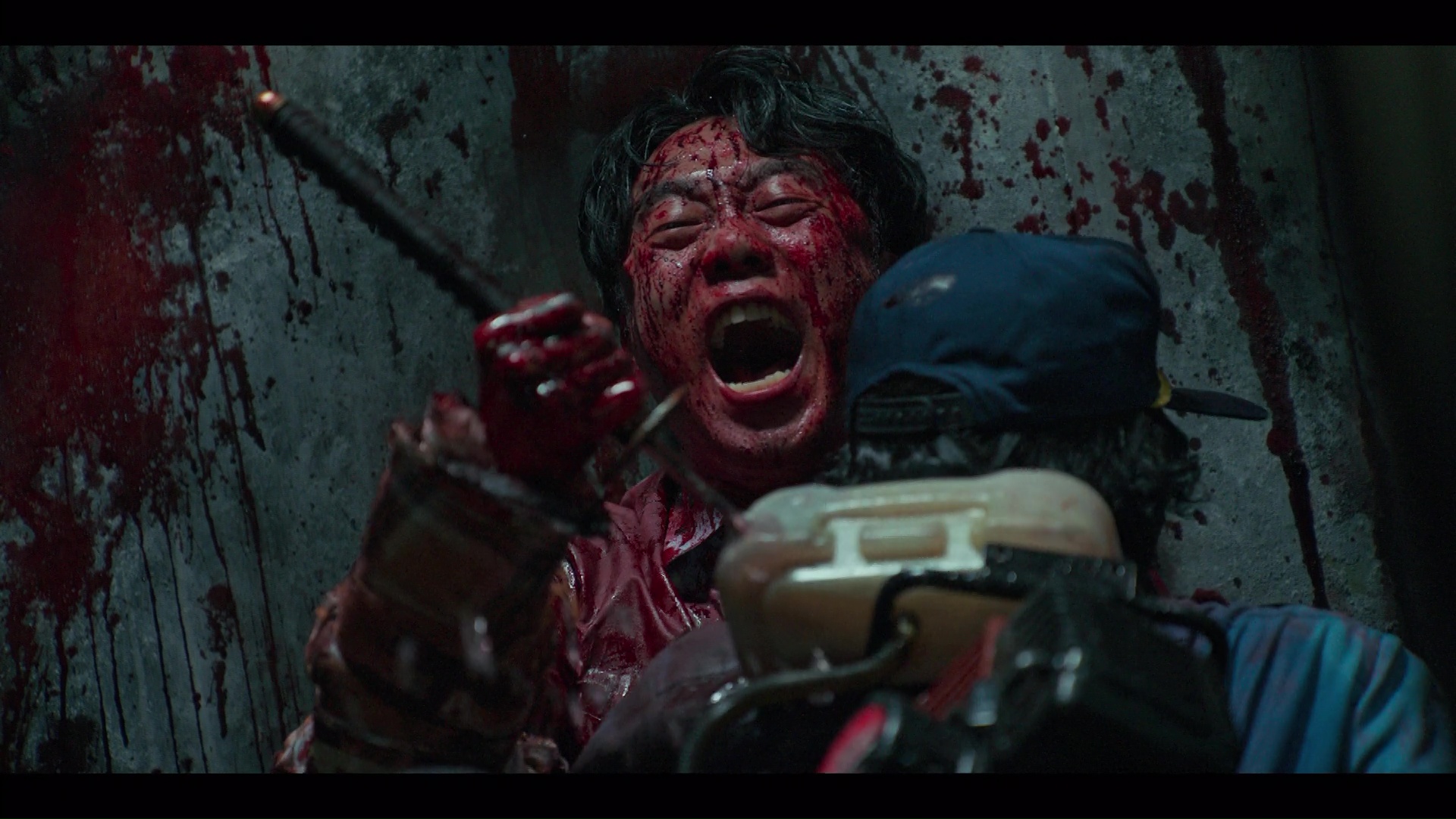
Another major theme near the end of the show is sacrifice, and every loss feels heavier the longer the survivors stay alive. The watershed moment of sacrifice comes from Jae-heon, who loses his arm and sword to the fly-infested guard monster. Jae-heon throws his whole broken and bloody self at the guard, and his sacrifice serves a greater purpose — it solidifies the survivors as a collective. The collective effort for survival depends on each individuals’ contribution, and the sum is greater than its parts. Doo-shik’s sacrifice to save Hyun-soo also echoes the purpose of protecting as many individuals in the collective as possible in hopes of survival. His sacrifice also affirms to Hyun-soo that he’s human, that Doo-shik has always viewed him with dignity regardless of his physical form. Even Eun-hyuk sacrifices himself at the end, and his parting words to Eun-yoo and last words to Hyun-soo ring of hope and dignity.
As more survivors come to witness and empathize with Hyun-soo, the implications of acceptance extend into his past. When convenience store ajumma Sun-young begins to experience symptoms of transformation, she deeply empathizes with Hyun-soo and apologizes for being an incompetent adult. Her sincere and tearful apology brings him to tears, as it seems to represent an apology from the adults in his life who have failed to acknowledge his pain. Likewise, Doo-shik’s embrace and sacrifice at the end consoles Hyun-soo with the assurance that it’s not his fault, that it will be okay. The apology and comfort are a salve for his cuts, and the show captures these tender moments without the jarring comparison effect with the more graphic scenes.
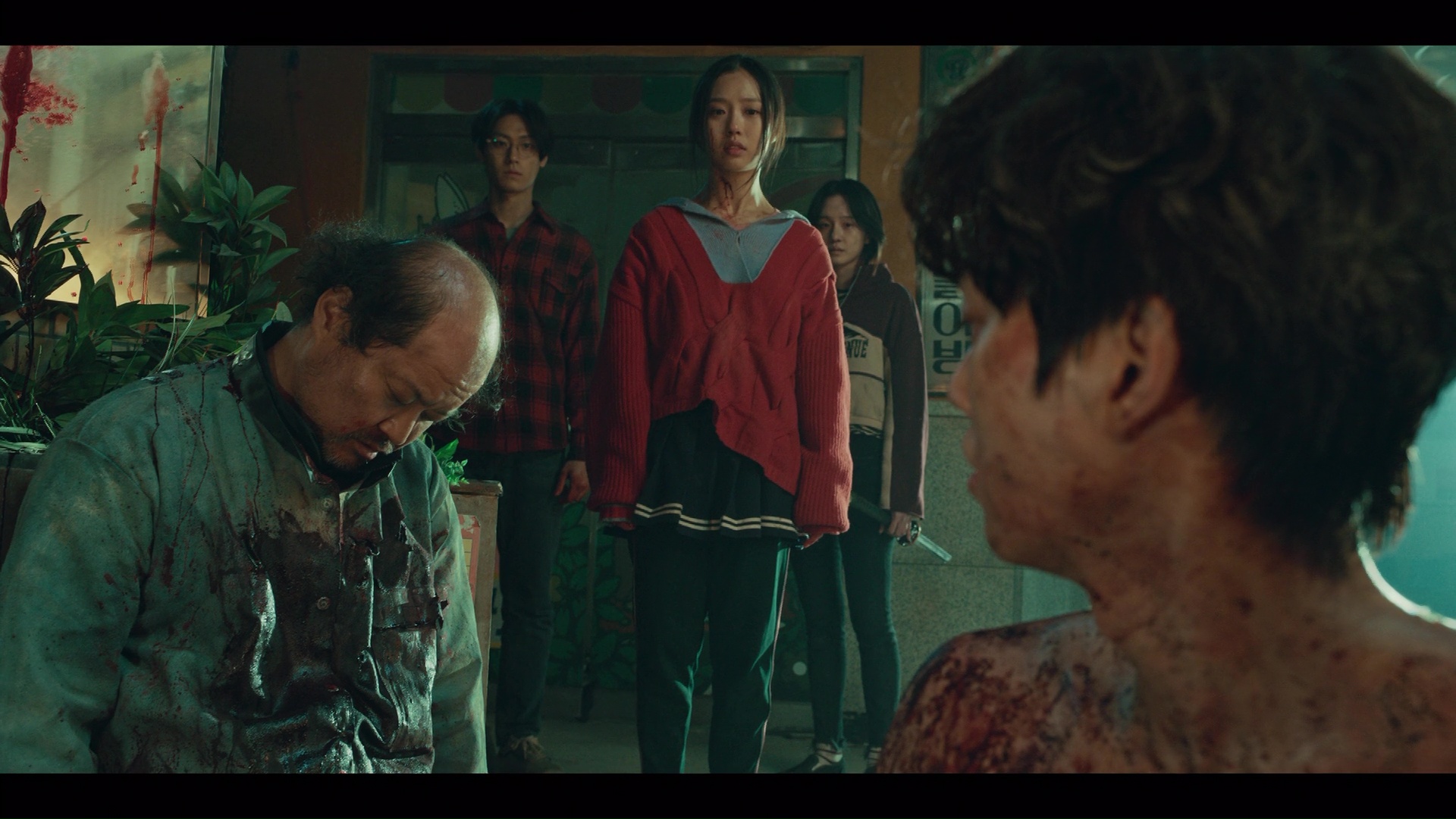
Even with moments of healing, Hyun-soo remains unstable, fragile from trauma and hardened by abandonment. His vulnerability allows another human/monster, Jung Eui-myung (Kim Sung-chul), to manipulate him and be the devil on his shoulder, convincing him that humans will never accept monsters like him. On the side of good, Hyun-soo proves that harmless monsters exist, but Eui-myung flips the question: Do humans who don’t harm monster exist? They do exist in Green Home, but the question effectively eliminates the nuance that Hyun-soo has experienced and learned so far.
The introduction of Eui-myung at this junction emphasizes the volatile nature of this apocalypse and brings back the human and monster dichotomy. When we see Eui-myung sadistically murdering people, it’s clear that he’s a different beast with no regard for humanity, unlike Hyun-soo, and he’s hardened by the people who have never treated him humanely. Hyun-soo is fundamentally human because of his instincts to honor life but also because in his weakest moments, he has friends to embrace and protect him. The human connection saves Hyun-soo from his own desires for cruelty, and without the survivor community, Hyun-soo faces a battle with himself.
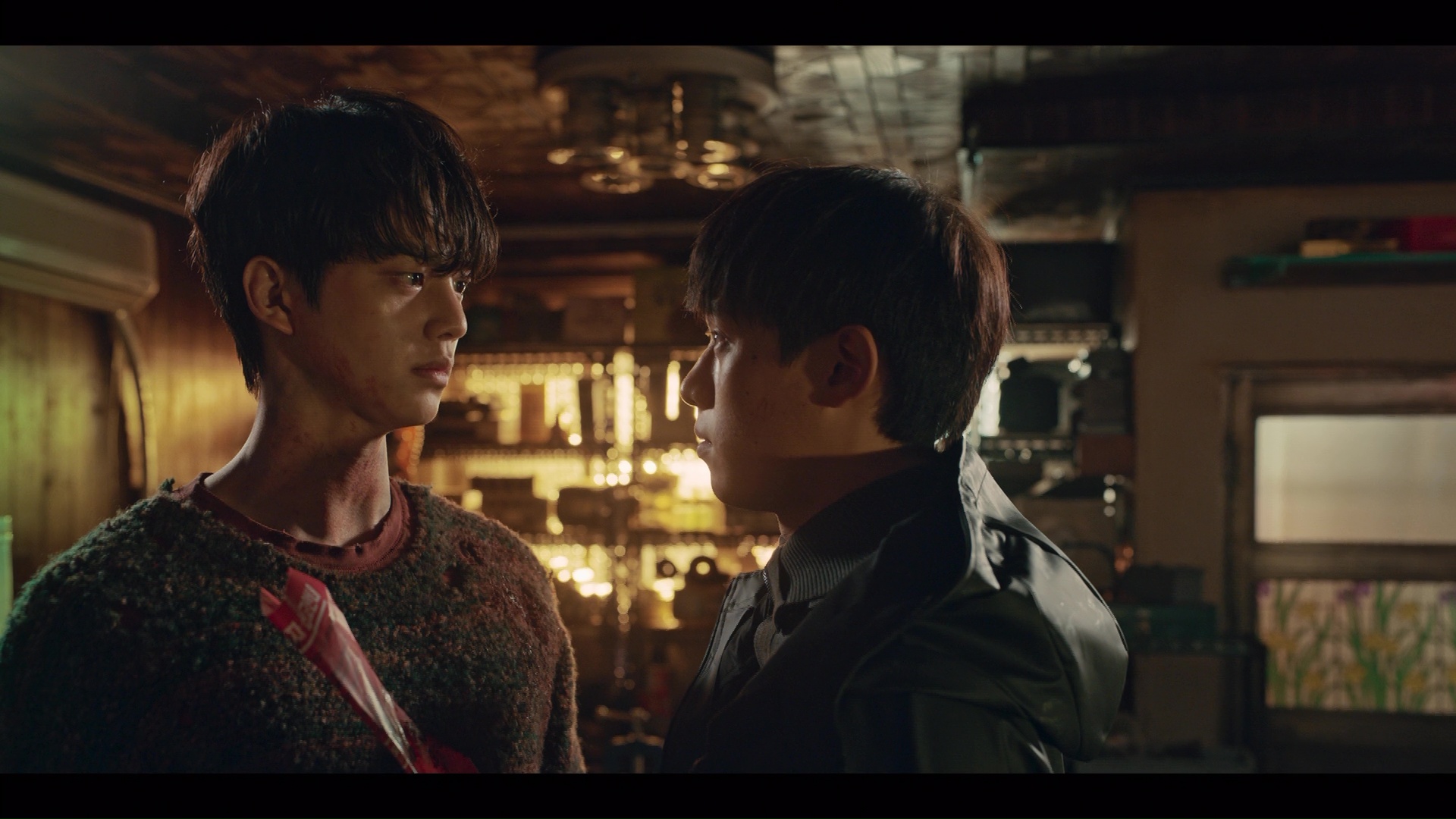
FINAL THOUGHTS: ENDING & POTENTIAL NEXT SEASON
The final two episodes strongly hinted at a government conspiracy as the cause for the monster catastrophe, and many questions remain unanswered. Distrust of the military and skepticism around their promise of a “safe camp” was shared amongst the more critical survivors, who knew that any absolute promise of safety in the midst of uncertainty was likely a false promise. With Hyun-soo in the hands of the military and the remaining survivors in transit to the “safe camp,” any hope for survival seems to be lost. But is Hyun-soo actually being held by the military? The appearance of Sang-wook at the end was a big twist, and I’m betting that Eui-myung is in Sang-wook’s shell. Eui-myung’s freaky power to inhabit any human body is the explanation that makes sense to me right now, and I wonder if what that means for Hyun-soo’s safety. Is he better off in the hands of the military or joining a wild wolfpack of rogue monsters?
The series has a very strong cast, and I was impressed by actors’ execution of complex characters. I found Eun-hyuk and Sang-wook’s characters particularly interesting and well-acted because their portrayal heavily depended on their demeanor. Lee Do-hyun’s restraint and rare moments of emotional vulnerability were spot on, and he’s definitely on my radar to watch in future projects. I was familiar with most of the cast but had not seen Song Kang in anything before this. I honestly thought he was an idol actor (it’s his pretty face, very distracting misleading) and wasn’t sure about the casting, but he proved me wrong. It helps to have an interesting and complex character, but it’s not a given that an actor can deliver on all the dimensions of a rich character. Song Kang delivered, and I hope we get to see more of his darkness as Hyun-soo.
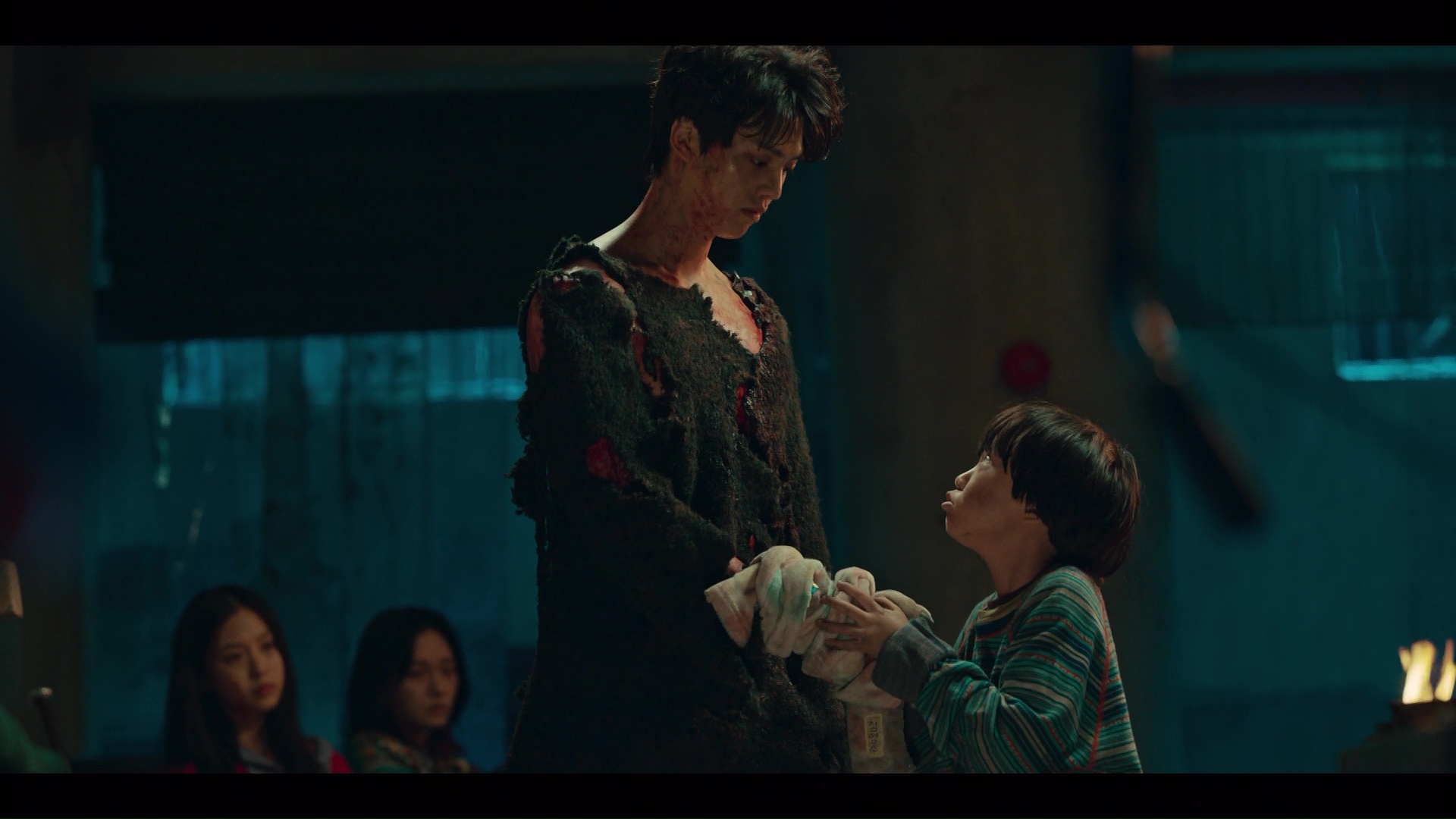
My biggest misgivings about the characters have nothing to do with the acting and more to do with the writing and editing. I wish we had more explanations about how Gil-seob knew about the bunker, what desires haunted our survivors, and why Eun-hyuk decided to sacrifice himself. These gaps in the story were glossed over for the sake of convenience and possibly limited runtime, but they feel like missed opportunities to me. I imagine some of the missing context can be filled in by reading the webtoon, and I also wonder if any of these gaps may be addressed in the potential next season.
The ending leaves the show wide open for a next season, and I think a second season would be helpful to fill in some of the incomplete characterizations and incorporate feedback from the first season. The loss of key characters from this season means that the remaining survivors will have a larger role the strategy for survival, but I have a sneaking suspicion that Eun-hyuk may come back as a monster. Regardless of his comeback, I’m excited at the prospect of Eun-yoo and Ji-soo getting more screen time and leading the survival effort in the future. I sense that Eun-yoo and Ji-soo have more potential, and I think centering their screen time on fuller characterizations instead of their contentious relationship would be more interesting.
Yi-kyung is a character I hope will continue to go rogue and be at the helm of uncovering the truth. The story will veer off from the original webtoon with Yi-kyung — a drama original character — driving the search for the truth, and I hope the series is open to making more adjustments from the webtoon to take advantage of her great character. My wish list for the next season also includes minor points like a better soundtrack (please no more Imagine Dragons) and better CGI (no claymation please), but those are just my nice to haves. This first season plants lots of seeds for a second season, and I would love to see the potential of the first season be actualized in a follow-up season. The series was good, even with its flaws, and I’m hopeful that a second season will build on the energy, momentum, and constructive feedback from the first season. We’ll see if Netflix agrees.
